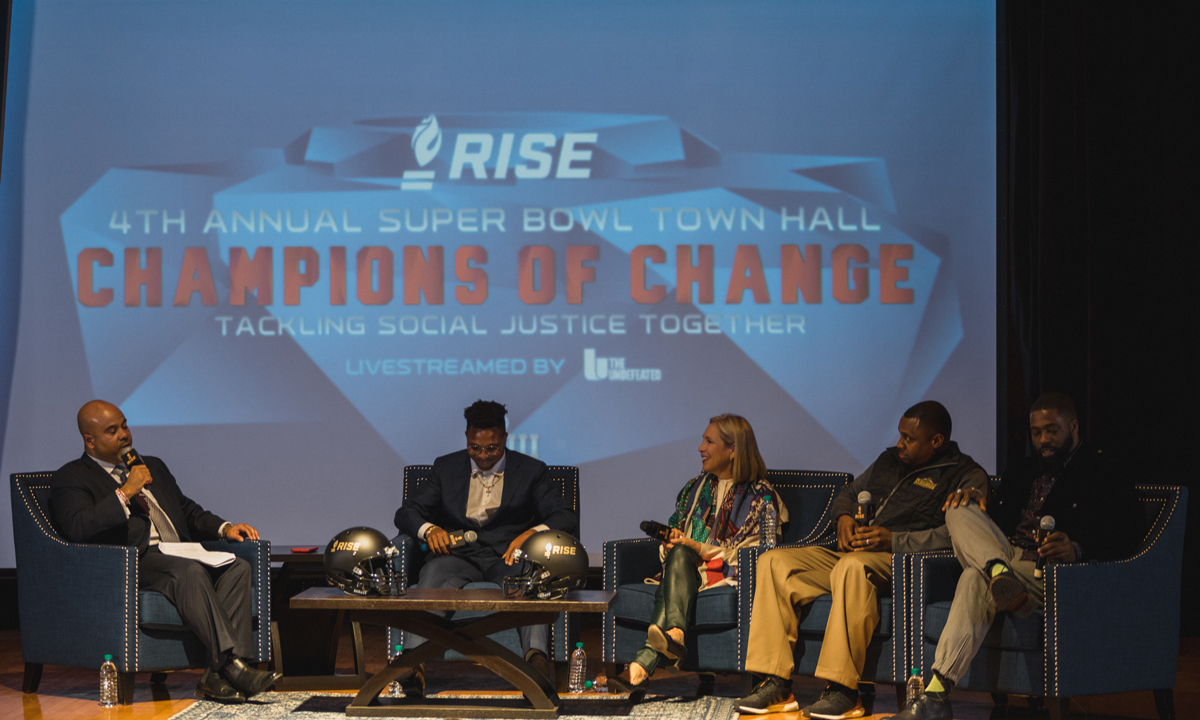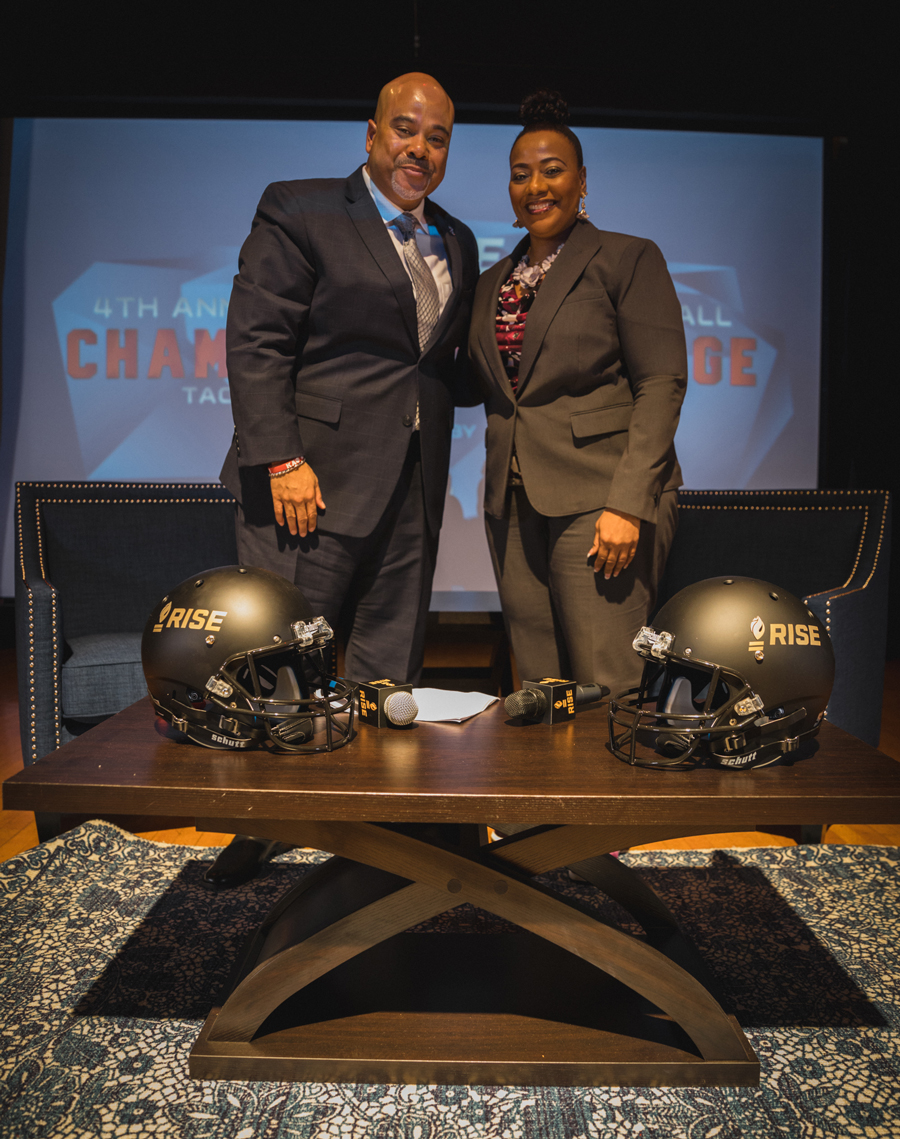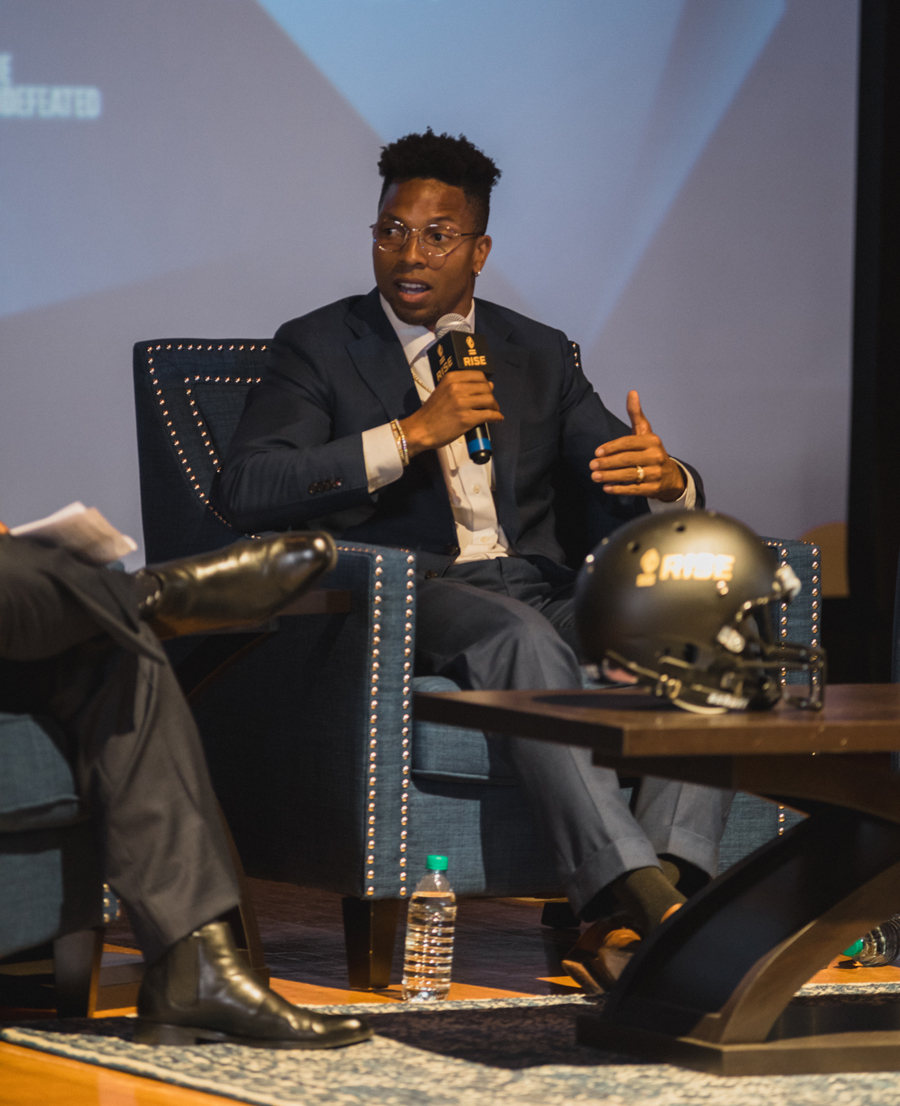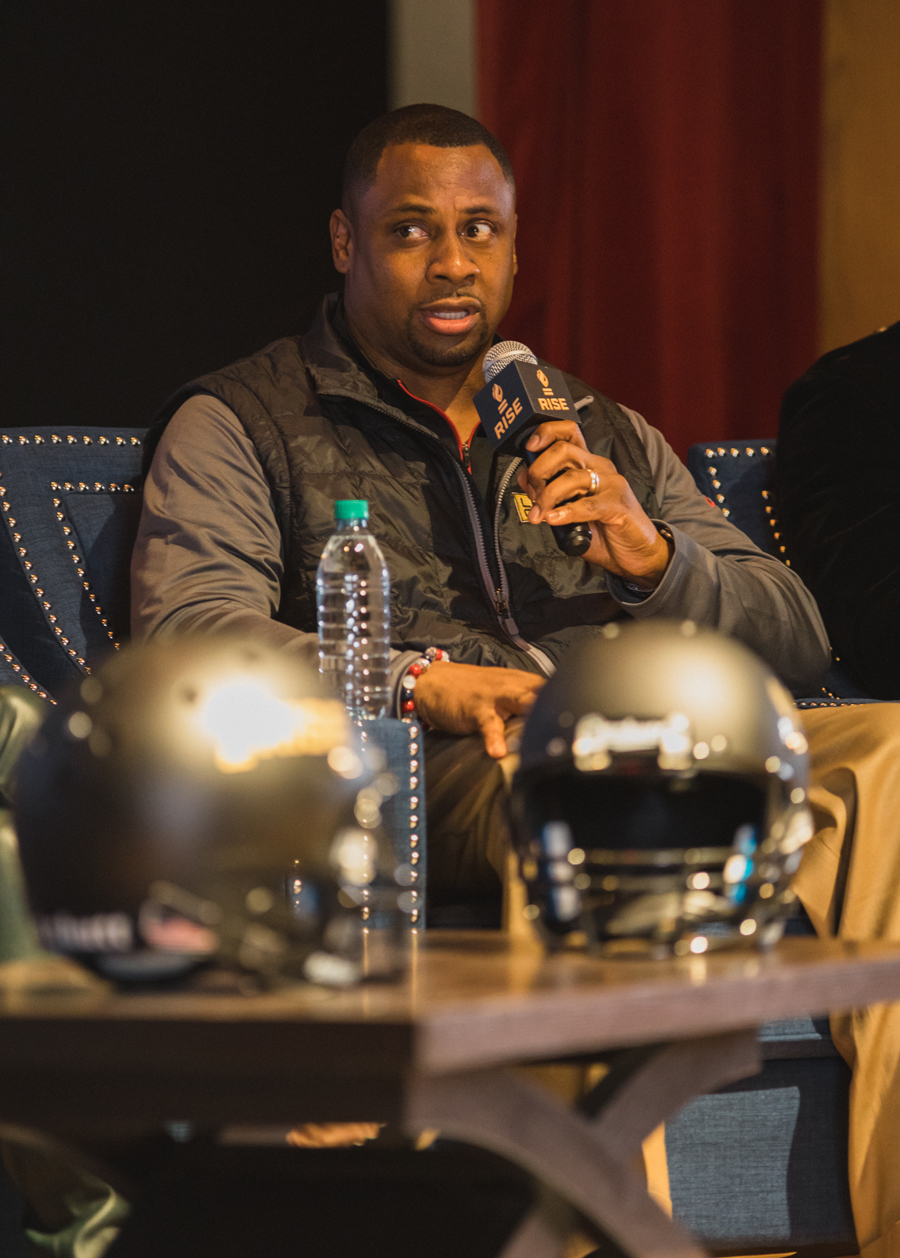
Photograph courtesy of Ross Initiative in Sports for Equality (RISE)
As what feels like the rest of the country descends on Atlanta for the Super Bowl, our city continually earns mentions as the cradle/pillar/birthplace/cornerstone of the civil rights movement in dozens of national articles. But what tangible role does that legacy actually play this week, for a league that has famously avoided substantially addressing social justice issues?
Visits to our civil rights tourist attractions, for one thing. On Tuesday, Patriots players made impromptu visits to the Martin Luther King Jr. National Historic Park and Ebenezer Baptist Church, among other sites. On Thursday, NFL commissioner Roger Goodell, Falcons owner Arthur Blank, and former NFL commissioner Paul Tagliabue stopped at the King park with Bernice King, CEO of the King Center and the youngest child of the civil rights legend. (More significantly, the Players Coalition met with local leaders on bail reform and awarded $2 million to six social justice organizations.)
But one of the only events with meaningful discussion of the modern civil rights issues roiling under the surface of this weekend’s events happened on Thursday afternoon at the King Center. Partnering with the NFL and the King Center, the Ross Initiative in Sports for Equality (RISE) hosted its fourth Super Bowl Town Hall, bringing together players, NFL execs, owners, and Bernice King to talk about criminal justice and activism, and what place they have in America’s favorite sport.
RISE, a national nonprofit that focuses on education within the sports community to eliminate racial discrimination, was founded in 2015 by Miami Dolphins owner Stephen M. Ross. RISE CEO Diahann Billings-Burford, who was appointed to her position last fall, started Thursday’s event, moderated by the Undefeated’s senior NFL writer, Jason Reid.
“Sports is one of those places where we set aside our differences to get toward a common goal,” Billings-Burford said in front of an audience of about 100 people.
Bernice King sat for an eight-minute Q&A with Reid, who asked her what she thought about the state of social justice in America. “I think we’re in a good place, because people are being forced,” she said. “And that’s good, because Daddy said, ‘We must learn to live together as brothers and sisters or together will be forced to live as fools.’”
“Too many people took a tranquilizer and slept for 50 years and didn’t realize that things were not over after Dr. King,” she said.
When asked about whether her father would still be optimistic today, she replied, “I think my father was always a realist, and part of his gift was he was a prophet. He would not be shocked or surprised about now, because he predicted this; he told us in ’67 that there was a necessary shift that we needed to make as a society, that we needed to become more of a ‘people’-oriented society than a ‘thing’-oriented society.”

Photograph courtesy of Ross Initiative in Sports for Equality (RISE)
Most of the RISE event focused on a four-person panel consisting of Falcons safety Ricardo Allen, Cleveland Browns co-owner Dee Haslam, NFL executive vice president Troy Vincent, and former Falcons linebacker Brian Banks. Reid, the moderator, asked probing questions about the NFL’s role in justice issues. From an owner’s perspective, Haslam said that, within the criminal justice space particularly, “there’s a lot we can do. No, we’re not a social justice [organization]; that’s not our mission or our goal. But I think it’s everybody’s responsibility. I think it’s an American issue.”

Photograph courtesy of Ross Initiative in Sports for Equality (RISE)
Allen is a member of the Falcons’ social justice committee, an offseason community outreach initiative encouraged by owner Blank. “I’m a true believer in, ‘so much is given, so much is expected,’” Allen said. “When you’re given this platform to impact, you have to do something. If not give some money, then give some time.” Vincent, the NFL exec and Sports Hall of Fame inductee, emphasized that point for some players who might not feel it’s their place to be a part of political discussions. “There will come a time when you will be reminded of exactly who you are: a black man in America,” he said.
Banks’s story, the subject of an eponymous movie out later this fall, brought the criminal justice discussion to a personal level: A promising high-school football star, he was convicted of rape at age 17 in 2002 after taking a plea deal; ten years later, the woman who accused him said she fabricated the story, and he was released with the help of the California Innocence Project. “When we look at our justice system, we have this image of a balancing scale: truth and justice, right and wrong,” he said. “But for years, our system has been lopsided, where it’s not about truth and justice or balance. It’s about being tough on crime, and sometimes that means you’re putting the wrong person behind bars.”

Photograph courtesy of Ross Initiative in Sports for Equality (RISE)
When Reid asked Vincent what he would say to critics who feel the NFL shouldn’t be involved in anything besides football, he replied, “They’re dinosaurs. They’re not living in reality. The disruption was necessary.” Haslam added that, in Cleveland, “I actually don’t think most of our fans are critical of it. I think they want us to focus on football, but they recognize that these men have the ability to make change in a positive way.”
Banks was more candid: “Here, we’re talking about racial equality, we’re talking about social justice, we’re talking about reforming our system. And some people have problems with that, because it’s always worked for them.”
He was also the only person to bring up the elephant in the room: Colin Kaepernick, the former 49ers quarterback who kneeled during the national anthem in 2016 to protest police brutality and started a wave of further protests and controversy. He hasn’t played in more than two years and has sued the NFL for allegedly colluding to keep him out of the league due to the protests. His name didn’t come up until the very end of the event, when Banks said of the NFL, “You want to make noise to let people know we’re working on some better changes? There’s a player right now who’s on the forefront of it all who still doesn’t have a job.”
On Friday, artist Fabian Williams (aka Occasional Superstar) found that a West End building with his mural—depicting Kaepernick—had been mysteriously razed. The building had been slated for demolition, but Williams told the AJC that he found the timing suspicious and that the building owner said “the city was complaining to him about [the mural].” As the story traveled across social media, it served as a good reminder: This weekend might be first and foremost about football, but football has never been just about the game.
https://www.instagram.com/p/Bm_BEMkDep9/
Watch the full event, live-streamed by the Undefeated, here.










![The North Carolina Museum of Natural Sciences’ newest exhibit is a [pre]historic first](https://cdn2.atlantamagazine.com/wp-content/uploads/sites/4/2024/04/DD-3-100x70.jpg)


